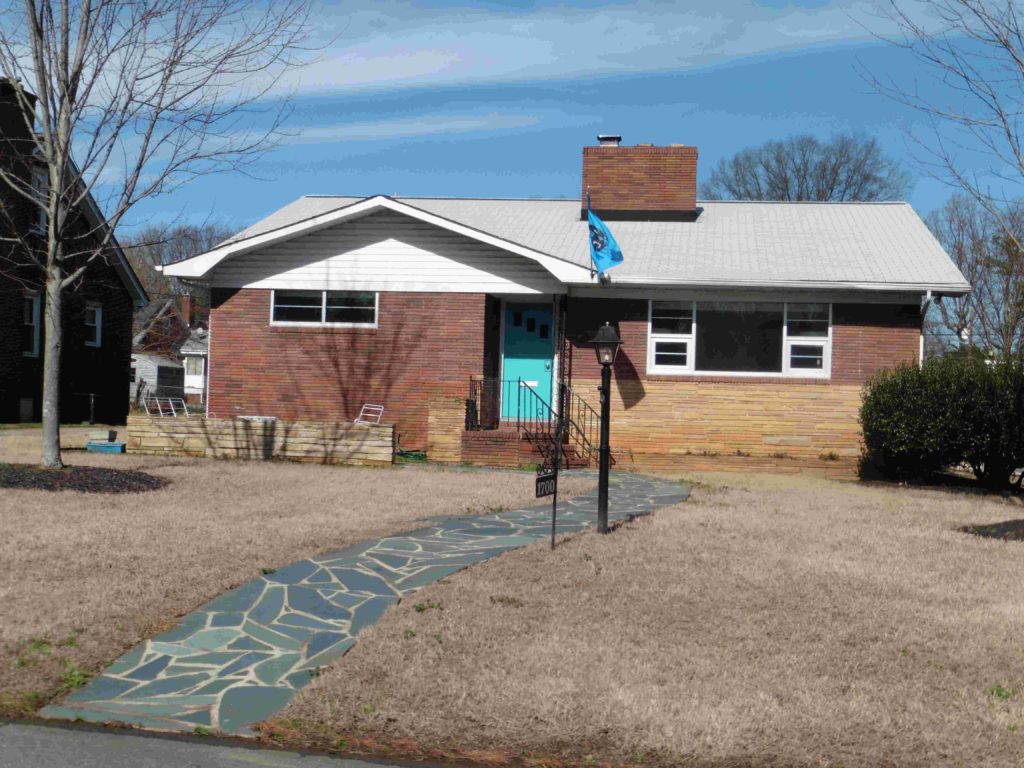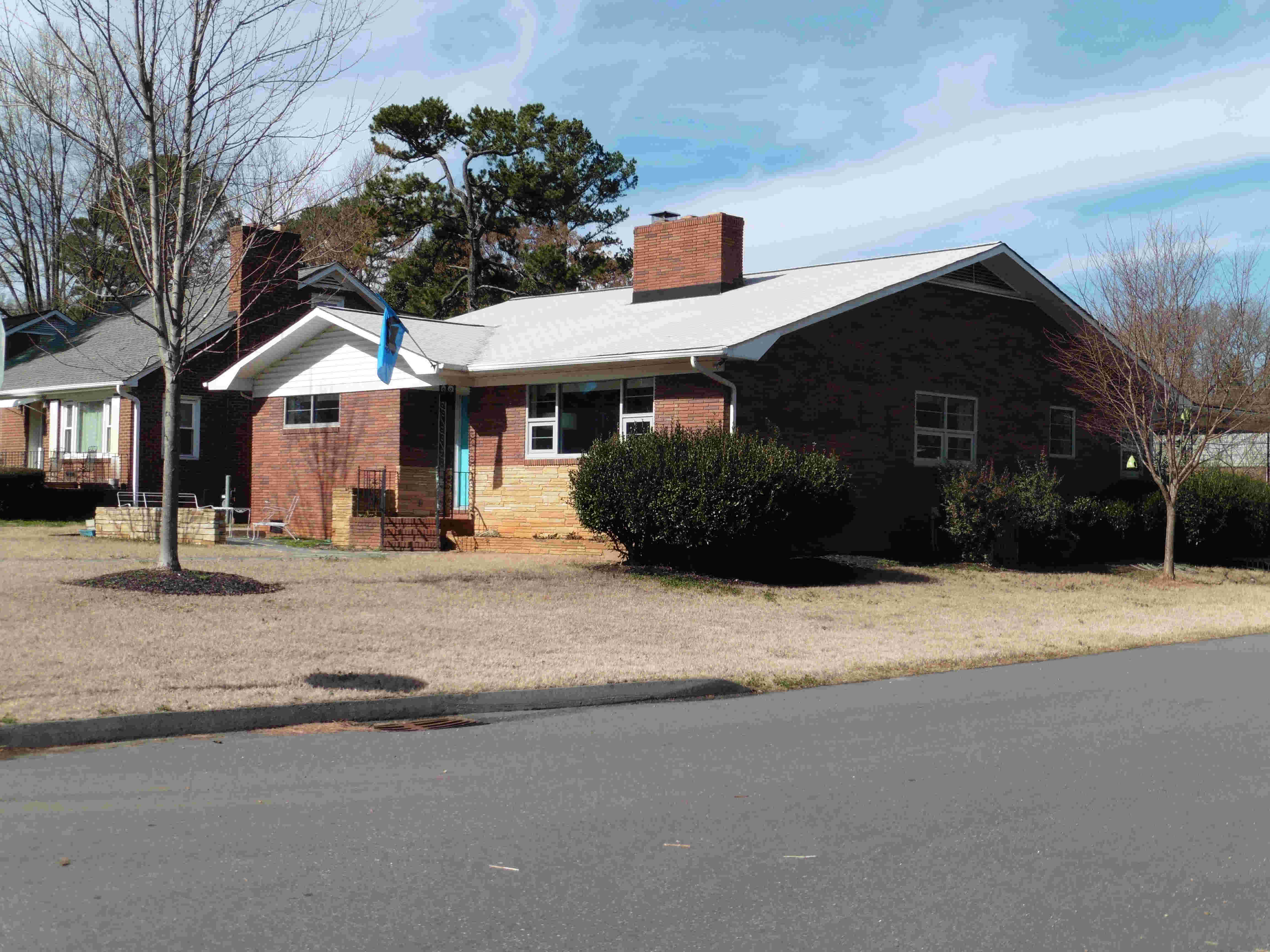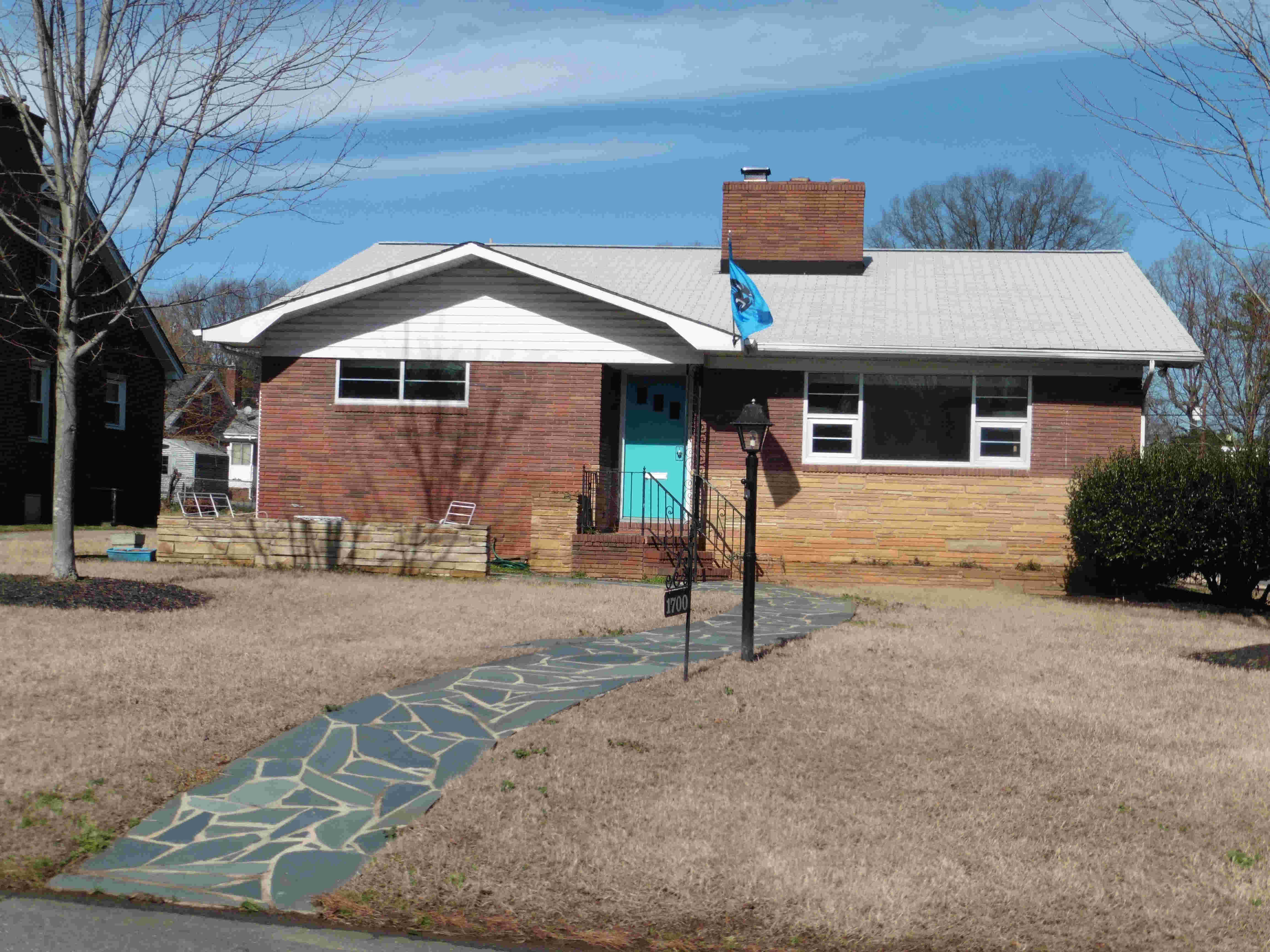1700 Madison Avenue
 Built in 1959-60, longtime home of postal worker Oren McCullough, Jr., and his wife Ruth, a schoolteacher. Mr. McCullough was a trailblazer in opening government employment to African Americans in Charlotte. “In 1948, Oren and ten other African Americans became the first of their race to be hired by the United States Post Office in Charlotte as Letter Carriers,” reported his funeral program.
Built in 1959-60, longtime home of postal worker Oren McCullough, Jr., and his wife Ruth, a schoolteacher. Mr. McCullough was a trailblazer in opening government employment to African Americans in Charlotte. “In 1948, Oren and ten other African Americans became the first of their race to be hired by the United States Post Office in Charlotte as Letter Carriers,” reported his funeral program.
* * *
Ed Griffin, a white contractor in Charlotte, listed himself as the owner when he took out the permit to construct this house in 1959. Griffin “spec-developed” at least one other house in McCrorey Heights, at 1717 Madison Avenue. He also custom-built three houses for notable McCrorey Heights clients: school principal Clarence Moreland (1617 Patton, 1956), JCSU Education department chair Lloyd Davis (1663 Madison, 1958), and barber A.D. Neal (1805 Patton, 1959).
This house at 1700 Madison Avenue was occupied beginning about 1960 by Oren McCullough and his wife Ruth. They resided here for over two decades, into at least the 1980s. Mr. McCullough worked for the U.S. Post Office, one of the best-paying and most stable careers open to African Americans in the era of segregation. Mrs. McCullough taught at Double Oaks school, just down the hill from McCrorey Heights. Those jobs marked them as typical of the two-career families that made up the first generation of McCrorey Heights homeowners in the 1950s.
But Oren McCullough was not typical: he had helped open post office jobs to African Americans.
Oren McCullough, Jr. (2.25.1921 – 1.22.2004), was born in Jefferson, S.C. but grew up in Charlotte. After graduating from Second Ward High in 1938, in the words of his obituary, “Oren adventured off to the United States Navy.” Back home four years later, he enrolled at Johnson C. Smith University.
There he found one of the great passions of his life, Omega Phi Psi fraternity. For well-educated African American men in the South, a fraternity was not merely a rooming house and some buddies to hang out with during college, but rather was a life-long organization for social meetings and civic action. Charlotte’s Omega chapter, founded in 1927, included “educators, doctors, lawyers, business professionals, entrepreneurs, banks, ministers, college presidents, judges, state and local politicians, Armed Forces and engineers,” a chapter history proclaimed. McCullough was named an Omega Man of the Year and was “honored locally and nationally in the fraternity,” his obituary reported. In 1964-65 he led the local chapter as its Basileus.
Oren McCullough’s education, his military discipline, and his social connections likely all helped him in the effort to win employment at the Post Office — a decade-long campaign instigated by crusading journalist Trezzvant Anderson. UNC Chapel Hill history student Willie Griffin has recently complete a Ph.D. dissertation tracing Anderson’s remarkable career of activism throughout the United States. Anderson worked for the Railway Mail Service and also wrote for the Pittsburgh Courier as he travelled. In the early 1940s he spent time on the JCSU campus with budding activist Reginald Hawkins (see 1703 Madison Avenue) at his side, urging students to march to the Charlotte Post Office to demand the hiring of black mail carriers.
Griffin’s research only covers Trezzvant Anderson’s early interactions in Charlotte; more research is needed to learn exactly how and when success was achieved. The sentence in Oren McCullough’s funeral program — “In 1948, Oren and ten other African Americans became the first of their race to be hired by the United States Post Office in Charlotte as Letter Carriers” — is the best clue we have.
Other research shows that McCullough kept pushing after that initial success. In the late 1960s and early 1970s he filed a series of complaints showing clear evidence that African American postal employees were promoted to supervisory positions much less often than white employees. Several others lodged similar complaints, including McCullough’s next door neighbor Rowe “Jack” Motley. Civil Rights attorneys James Ferguson and Louis LeSesne made the material part of a Federal court case, Chisholm v. United States Postal Service. In 1980 Judge James McMillan awarded back pay to McCullough and others and required the Post Office to change its promotion practices.
* * *
With his job secure at the Post Office, Oren McCullough married Ruth Caudle on August 16, 1952. Together they carefully saved enough money to purchase this house seven years later. She was a school teacher who taught at Double Oaks Elementary down the hill from McCrorey Heights when they moved into their new home. They raised three daughters here on Madison Avenue: Avonnette, Chiquita and Carolyn. Oren and Ruth marked their fiftieth wedding anniversary shortly before Oren passed away in 2004.



Architecture
Ranch house, one-story in red brick. There is a main gable roof plus a front gable over a projecting bay. Note the stonework band beneath the front picture window. A prominent chimney pierces the front roof near the ridgeline. Windows throughout the house were replaced with modernistic metal-colored units about 2015. Located on a corner lot with the front facing Madison Avenue, the side facing Clifton Street.
Building permits
Madison 1700 permit a
Date issued: May 28, 1958
Owner: Edwin Thompkins & Wife
Contractor: Mangie McQueen
Estimated cost:
Other permit info: addition. [This permit is likely mis-numbered, actually for 1800 Madison]
Madison 1700 permit b
Date issued: January 30, 1959
Owner: Ed Griffin Construction Co.
Contractor: Ed Griffin Construction Co.
Estimated cost:
Other permit info: build residence
Madison 1700 permit c
Date issued: February 4, 1959
Owner: Ed Griffin
Contractor: Hill Electric Co.
Estimated cost:
Other permit info: wiring, probably for original construction of house
First appeared in city directory
1960 – Oren McCullough & Ruth
He: Post Office
She: Teacher, Double Oaks School
1982 city directory — He: Carrier, Post Office. She: no occupation listed.
obituary
Resources
“African-American Postal Workers in the 20th Century,” US Postal Service. On-line at: https://about.usps.com/who-we-are/postal-history/african-american-workers-20thc.pdf
Chisholm v. United States Postal Service, 516 F. Supp. 810 (W.D.N.C. 1980). On-line at: https://law.justia.com/cases/federal/district-courts/FSupp/516/810/1579194/
Griffin, Willie James, Courier of Crisis, Messenger of Hope: Trezzvant W. Anderson and the Black Freedom Struggle for Economic Justice (Ph.D. dissertation, UNC Chapel Hill, 2016).
Pi Phi Omegas website, including http://piphiomegas.org/about-pi-phi/ and http://piphiomegas.org/about-pi-phi/chapter-basilei/
McCullough, Oren, funeral program in the History Room, First United Presbyterian Church, Charlotte.